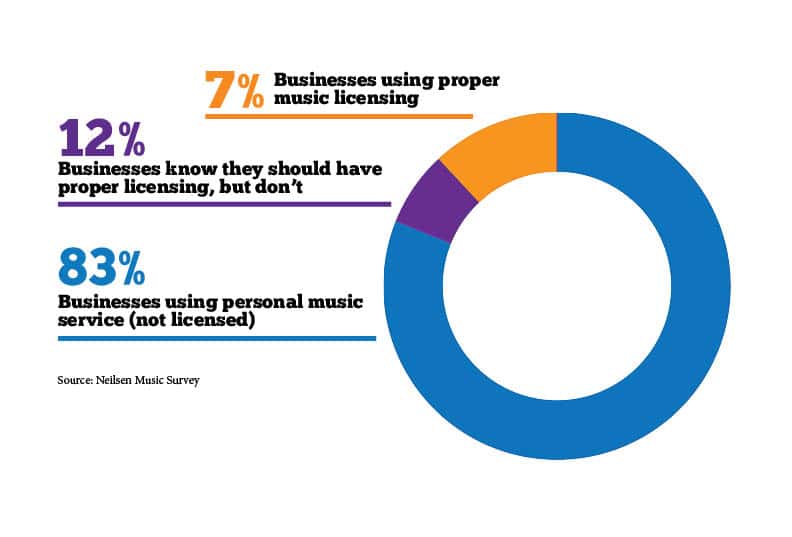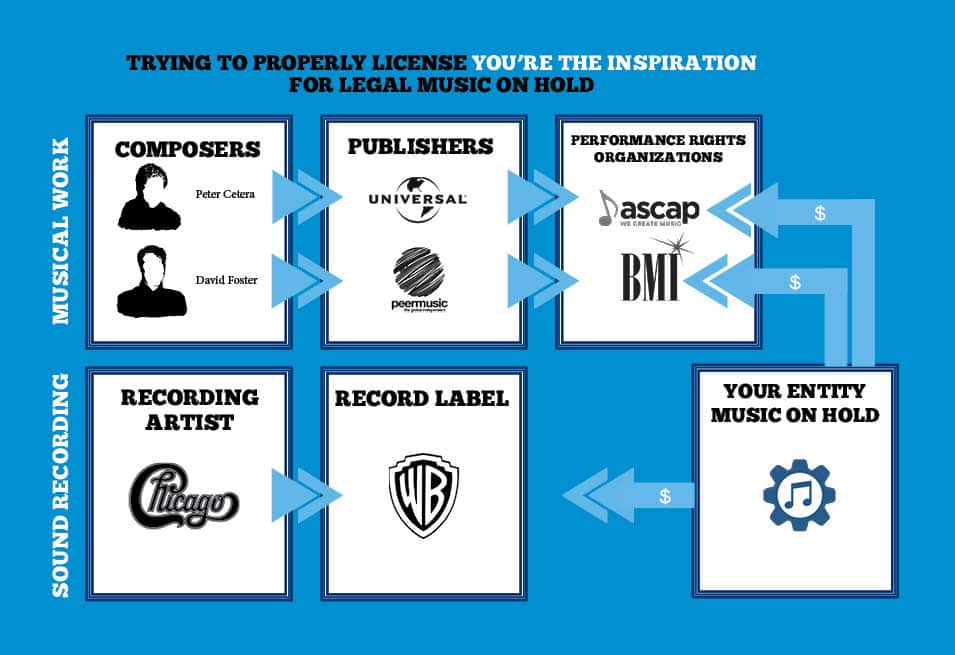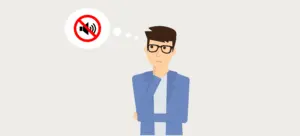You’ve got a new phone service or a new communications platform or system, and it’s time to choose the music on hold. You’ve got the perfect song. A song that will make callers feel appreciated and inspired: You’re The Inspiration by the group Chicago. Perfect.
This should be easy. There are so many great music sources today: Amazon, Spotify, Apple Music, and so on. You’re pumped. Then that know-it-all Linda from “legal” bumps into you while you’re pumping a dark roast from the Bunn coffee dispenser and asks, “Are you going to use legal hold music?”
“Legal hold music? Um, yeah. Of course,” you stammer. You are planning to pay for the song and not ask 90s music fanatic James in accounting to email it to you. Legal, right?
Please note that we are not attorneys; the information presented here is not legal advice. We encourage you to do your own research and investigate other sources, including those linked here.
You Paid For The Song. Can You Put It On Your Phones?
You just purchased You’re The Inspiration, by Chicago from Amazon and are ready to put it on your phone system for callers to hear while they wait. The next step is to copy the recording onto the phone system server to play (perform) the song for your callers. Copy and play. Got it.
Email from Linda: “Please refer to the attached Amazon Music Terms of Use.”
You may use the Services only for your personal, non-commercial purposes. …you may not redistribute, transmit, assign, sell, broadcast, rent, share, lend, repurpose, modify, adapt, edit, license or otherwise transfer, or use Purchased Music or Music Service Content. We do not grant you any synchronization, public performance, public display, promotional use, commercial sale, resale, reproduction, or distribution rights for any Music Content.
Exerpts from Amazon Music Terms of Use Agreement
Copyrighted Music is Licensed, Not Sold
The MP3 you bought on Amazon did not become your property just by purchasing a copy of the recording. Amazon cannot provide the permissions you need for legal music on hold, as is true with almost all digital assets. In fact, the rights to the download are only temporary and definitely not for commercial use.
…ebooks, mp3 albums, digital movies, games, and software are not sold, but merely licensed. The terms limit consumers’ ability to resell, lend, transfer, and even retain possession of the digital media they acquire.
University of Pennsylvania Law Review
We still don’t have legal hold music.
The Definition of Legal Hold Music
Legal Hold Music is music on a business phone system for which all licenses required by law have been paid. What licenses?
Another email from Linda in legal: “Please refer to the attached communications platform agreement.” Consider this example from Microsoft Teams. Similar language is used by all communications platforms.)
You are responsible for independently clearing and securing all necessary rights and permissions to use any music or audio file with your Microsoft Teams service. This may include intellectual property and other rights in any music, sound effects, audio, brands, names, and other content in the audio file from all relevant rights holders. Holders may include artists, actors, performers, musicians, songwriters, composers, record labels, music publishers, unions, guilds, rights societies, collective management organizations, and any other parties who own, control or license the music copyrights, sound effects, audio and other intellectual property rights.
https://docs.microsoft.com/en-us/microsoftteams/music-on-hold
Intellectual property? Publishers? Record labels? Why are there so many different types of licenses for music? To answer that you’ll need to know the basics of music copyright law.
Music copyright is insanely complicated.
A Quote from Digital Music News
Musical Works vs. Sound Recordings
Copyright law protects the owners of creative assets. For music, there is an important distinction between musical works and sound recordings. Each has its own kind of copyright protection.
Musical Works
A Musical Work is a song’s “underlying composition.” The song, You’re The Inspiration was written by Peter Cetera and David Foster. The composers exclusively control how the song can be distributed and used in a public setting. If you want to play any recording of You’re The Inspiration, you will need permission from Mr. Cetera and Mr. Foster. This is called the public performing right, for which we will need a public performance license.
Sound Recordings
Sound Recordings are audio recordings. For our discussion, we will refer to recordings of musical works, although the term can mean any audio recording. If you want to make a copy of the recording of You’re The Inspiration, you will need permission from the group Chicago (or the recording company that manages the recording, in this case, Warner Brothers). They exclusively control how the recording can be used, including all copies or reproductions. If we want to make a copy of the recording, we will need to obtain a reproduction license.
The right of reproduction is the right to duplicate, transcribe, imitate, or simulate a work in a fixed form. In the context of music copyrights, the right of reproduction authorizes the copying of musical works (e.g., duplicating sheet music) or sound recordings. Infringement of these rights would be the unlawful copying of the copyrighted work.
Congressional Research Service
Since you will need to place a copy of the recording on your phone system and play (perform) the composition to your callers, you will need both a public performance license and a reproduction license.
Obtaining a Performance License For Legal Hold Music
When your customer calls your business and hears You’re The Inspiration while waiting on hold, your company has just conducted a public performance of that composition. Mr. Cetera and Mr. Foster, the composers, have licensed their musical works to publishers. The publishers are represented by a performance rights organization (PRO) for the purpose of collecting fees from performance licenses. Who has to pay for performance rights? Restaurants, gyms, TV and radio stations, dance studios, and businesses with music on their website and on hold—every entity, for-profit or not—are required to pay the PROs.
Most businesses incorrectly assume that a music download, an audio CD, or a personal Spotify or Pandora account includes the right to play the music in their business. A Neilsen Music survey, quoted in the Wall Street Journal, revealed:
- 83% of businesses use a paid personal music service in their establishments.
- 71% incorrectly believe that using their personal music service includes proper licensing (it does not).
- 21 million businesses are playing music illegally.

Which PRO should you pay?
In the US, the PROs include SESAC, ASCAP, BMI, and GMR. These organizations collect fees on behalf of the copyright holders. You can identify which PRO represents a song by using a lookup tool, such as BMI’s Longview Search. You will discover that the song You’re The Inspiration is registered by Universal Music Publishing in an agreement with BMI. Therefore, a performance license from BMI is required. But wait. The co-composer, David Foster, is published by Peer Music and is in a licensing agreement with ASCAP, another one of the PROs. This means we will also need a performance license from ASCAP.
Many songs have multiple composers and publishers, making it necessary to pay more than one, and as many as four, Performance Rights Agencies.
So, with performance licenses in place, we can put the song on the phone system, right? No, not yet. We still need permission to make a copy of the song so it can reside on our phone system.
Can I License Sound Recordings for Legal Hold Music?
Recording artists typically sign their recordings over to a record label for management. Unlike performance rights, sound recording rights apply to each individual recording of a composition. If you can’t get Warner Music to sell you a license for the Chicago recording of You’re The Inspiration, you could try to get a license for the recording Peter Cetera did with the vocal group Az Yet in 1997. In that case, you would need to track down Platinum Entertainment, Inc., in Nashville, TN. The answer to our question, “Can I license sound recordings for legal hold music?” is a tentative “yes.” The trouble is that there is no agency or streamlined pathway to arranging reproduction licenses. There is no “performance rights agency” for making copies of recordings.

Avoid Do-It-Yourself Legal Hold Music
We started out with the idea of telling our callers that “they’re the inspiration” for our business. Now, that clever hold music idea looks like a long shot. Even if we could get ahold of the licensing division of Warner Music, an ongoing royalty contract can cost thousands, up to hundreds of thousands of dollars, depending on factors including locations, audience size, term of use, etc.
Music licensing is complex. “It requires a command of copyright law and of the intricacies of the licensing process, an understanding of customary deal terms and of market practices, careful attention to detail, effective negotiating, and, sometimes, detective work to identify the parties around the globe who control the rights needed,” says entertainment and media lawyer Derek Desler. Getting music licensing wrong has significant consequences:
In recent years, record companies and music publishers have vigorously enforced their copyrights. Statutory damages for copyright violation can amount to $150,000 per infringement and criminal infringement is punishable by up to 10 years imprisonment.
Business Law Firm Brooks, Pierce, McLendon, Humphrey & Leonard, LLP
The Solution: Use a Commercial Music Service
You know licensing music can be complex. Look for a business that specializes specifically in providing legal, licensed music for business. Easy On Hold provides a service called Brandi Music, which has more than 70 channels of music for business use. You want a commercial music service.
A commercial music service pays both performance rights and a form of reproduction rights called ephemeral rights. These rights are handed through statutory licenses and are available for commercial business music services only. Specifically, you can find details in the U.S. copyright law sections 112 and 114 of the Copyright Act, 17 U.S.C. §§ 112 and 114. Congress set up SoundExchange, an agency that “collects and distributes digital performance royalties on behalf of over 245,000 recording artists’ and master rights owners’ accounts,” as stated at soundexchange.com.
Commercial music services pay a percentage of revenue to SoundExchange to cover the sound recording licensing you would otherwise need to obtain from record labels. Therein lies the convenience and value of contracting a commercial music service for your use of music on your hold button and as background music in your office, store, restaurant, or other public space.
Yes, there is such a thing as legal hold music. We think you’ll appreciate the worry-free services of Easy On Hold and Brandi Music.




